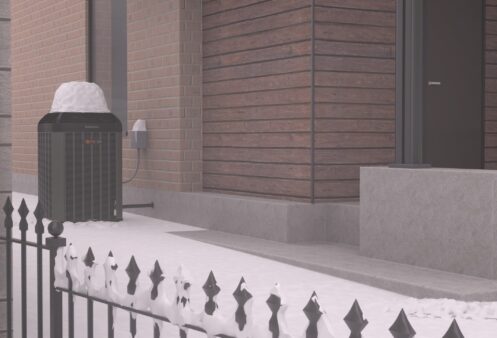Contrary to popular belief, air conditioners technically don’t produce cold air but instead use cold refrigerant to remove heat from the building so that the temperature quickly drops. As the cold refrigerant absorbs heat, moisture in the air condenses on the evaporator coil and then drips down into the drain pan and flows out through the condensate drain system. The fact that the refrigerant is so cold means that the condensation can quickly start to freeze if there isn’t sufficient warm air constantly blowing over the evaporator coil.
A frozen air conditioner is almost always related to a lack of warm air flowing over the evaporator coil, and there are several different issues that can prevent the system from drawing in enough air. Before we look at the specific issues that can cause an AC system to freeze, it’s first important to look at the ways you can tell if your AC is frozen and what to do if this happens.
How to Know If Your AC Is Frozen and What to Do
The most obvious sign that your air conditioner is frozen is when the system starts blowing hot air out of your vents. If you do ever notice this, you should immediately turn the AC off at the thermostat and then look inside the air handler to see if there is ice on the evaporator coil. If the coil is frozen, you will then need to let it completely thaw out before turning your AC back on. This will usually take a few hours, but you can speed the process up a bit by setting the thermostat so that only the fan is running as this will bring warm air into the air handler so that the ice melts quicker.
A frozen air conditioner can be a serious problem. Not only will the system not provide any cooling when the evaporator coil is frozen, but continuing to let your AC system run when frozen has the potential to seriously damage the compressor motor or ruin the motor entirely. If the evaporator coil is frozen, the refrigerant won’t absorb any heat and will remain a cold liquid instead of being transformed into a hot gas.
If the refrigerant doesn’t turn into a gas before entering the compressor motor, the liquid can start to boil inside the compressor and cause some of the oil in the crankcase to burn off. This can eventually lead to there not being enough oil left to keep the motor lubricated, which can result in serious damage or cause the motor to burn out.
This is why it is vital that you immediately shut off your AC as soon as you know it is frozen as otherwise you could cause serious damage to your outdoor unit. Now that you know how to know when your AC is frozen and what to do, let’s look at the different issues that can cause this to happen.
Clogged Air Filter
As soon as you’ve determined that your AC is frozen and shut the system off, you should then replace your air filter. A clogged air filter is by far the most common issue that will lead to an air conditioner freezing. When the filter is excessively dirty and coated in dust, hair, and debris, it makes it nearly impossible for the blower to draw enough air into the air handler.
A clogged air filter is incredibly restrictive, which means that very little air can flow through the filter. Again, if there isn’t sufficient warm air coming in, the refrigerant won’t be able to absorb enough heat and thus will stay cold enough for the condensation on the evaporator coil to start freezing.
Closed, Clogged or Obstructed Vents
After replacing your air filter, you should then go around the house and check all of your supply and return air vents. You will typically have supply vents in every room, and these are where the cool air from the AC comes out. Most homes only have one or two return vents, and these vents are where warm air is drawn back into the system.
Supply vents generally can’t be closed as this would prevent any air from being drawn in. However, the same issue can occur if the vents are blocked by furniture or clogged with pet hair and debris.
Many people mistakenly believe that closing the supply vents in unused rooms will make their air conditioning more effective, but the truth is that this can have the opposite effect. If too many supply vents are closed, clogged or obstructed, it leads to a major increase in air resistance in the ductwork system. As a result, the blower won’t be able to circulate air through the system properly and the evaporator coil can begin to freeze up. The best way to prevent this is to always leave at least 75% of your supply vents open.
Malfunctioning Blower
There are also times when the problem is related to the blower itself. For instance, the blower may start to malfunction and no longer spin as fast as it needs to draw sufficient warm air into the air handler. This can happen because the blower motor is wearing out or because the blower is so dirty that it can’t function properly.
Dirty Evaporator Coil
This problem isn’t technically related to a lack of airflow, but it is still quite similar. When the evaporator coil becomes extremely dirty and coated in a thick layer of dust, it becomes insulated to where the warm air can’t come into contact with the coil. This will again prevent the refrigerant from absorbing enough heat and lead to it remaining cold enough that the condensation begins to freeze.
Low Refrigerant Charge
To function properly, all air conditioning systems require a specific level of refrigerant. If the system doesn’t have a sufficient refrigerant charge, it leads to decreased pressure in the system. The lower the refrigerant pressure is, the colder the refrigerant will be. As a result, the refrigerant that flows into the evaporator coil will be much colder than it should, and the system can quickly start to ice up.
If you find that your AC constantly ices up and the problem is not related to an airflow issue, you will need to have the blower inspected and the refrigerant charge tested. The refrigerant system is a closed loop, which means that the refrigerant charge should always remain constant. If a technician determines that your system is low on refrigerant, it likely means that there is a leak in one of the refrigerant lines, the evaporator coil, or the condenser coil. A leak in a refrigerant line is easy to fix once the technician locates it. If either of the coils is leaking, you will typically need to have it replaced.
If your AC is constantly freezing or the system has any other problems, the certified technicians from Agers Heating & Air Conditioning are always ready to help. We repair and service all models of residential and commercial AC units as well as furnaces, heat pumps and ductless mini-splits, and our team is also ready to assist with any of your HVAC installation or indoor air quality needs. To schedule an AC inspection or any other cooling or heating service in St. Peters or the St. Louis area, give us a call today.




